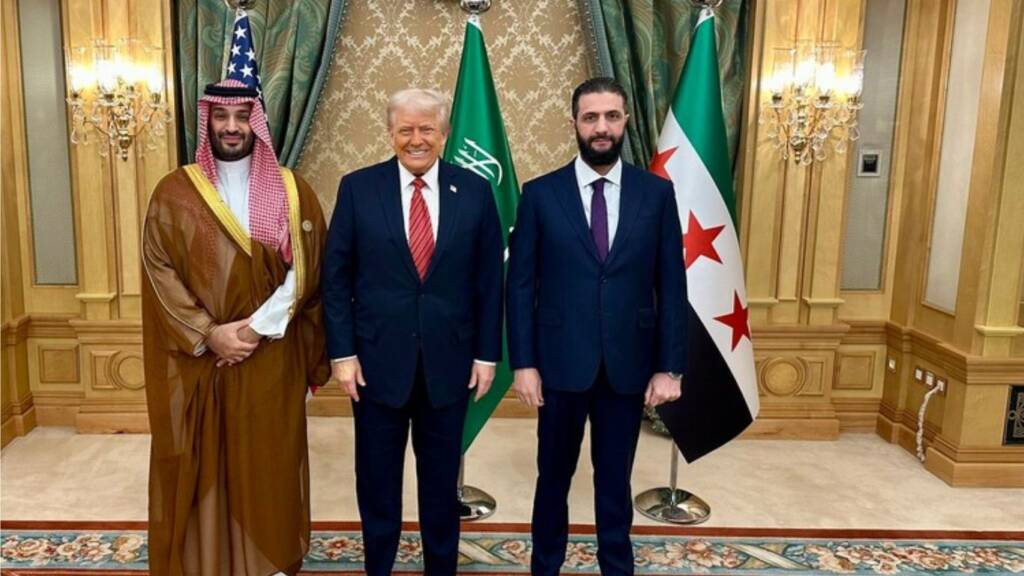In a surprising and historic move, U.S. President Donald Trump met with Syria’s new President, al-Shara, during his four-day official visit to West Asia. This meeting, held at the request of Saudi Arabia and Turkey, marks a major shift in the region’s political dynamics. It was the first time in 25 years that a U.S. President met a Syrian leader, signaling a possible end to Syria’s long isolation and civil war-driven chaos.
Al-Shara, who recently came to power after overthrowing the long-time dictator Bashar al-Assad, was once a Jihadist and even led a branch of Al Qaeda. His past has raised eyebrows globally, but this meeting suggests that he is now being accepted by powerful international players. The U.S., which not only tagged his organization as an Islamist terrorist organization but also, five months ago, had a $10 million bounty on him, is now talking peace and reconstruction with the former insurgent.
What Changed?
The biggest reason behind this sudden shift is national interest—a country’s strategic goals, economic ambitions, and regional influence.
For the United States, the move offers a new opportunity. Syria is rich in resources and is located in a very strategic region. With Assad gone and al-Shara leaning toward U.S.-friendly countries like Saudi Arabia and Turkey, Washington sees an opening to invest in Syria’s reconstruction. This not only brings economic benefits, such as oil and infrastructure contracts, but also weakens Iran’s influence, a long-time rival of the U.S. and its allies.
For Saudi Arabia and Turkey, the reasons are equally clear. They want to invest in Syria’s rebuilding process. With sanctions lifted, Saudi and Turkish companies can enter Syria’s market. This helps both countries economically, while also expanding their political influence in the region. Crown Prince Mohammed bin Salman and Turkish President Recep Tayyip Erdoğan played key roles in bringing al-Shara to the table. Erdoğan even joined the meeting by phone, showing how invested Turkey is in this new Syrian leadership.
What’s in it for Syria?
The lifting of economic sanctions will bring immediate relief to Syria’s struggling people. For years, sanctions have blocked trade, made foreign money transfers difficult, and left the country in financial ruin. Now, Syrians can import and export goods, receive money from abroad, and reconnect with global financial systems. This could improve daily life for ordinary Syrians, who have suffered greatly due to civil war, economic collapse, and international isolation.
However, this is not just about humanitarian concerns. It’s also a major political win for al-Shara. Being recognized by the U.S. and powerful regional players gives him legitimacy, both at home and abroad. His image is quickly changing from that of a rebel militant to a statesman.
The Bigger Picture: Changing the Balance of Power
The most important takeaway from this meeting is how it shifts the regional balance of power. Under Assad, Syria was a close ally of Iran. Iran used Syria as a land bridge to supply weapons to Hezbollah in Lebanon. This gave Iran a strong presence in West Asia through its proxies.
Now, that has changed.
Al-Shara is a Sunni Muslim, unlike the Shia-led Assad government. He is showing clear signs of aligning with Sunni-majority countries like Saudi Arabia and Turkey. If Syria moves out of Iran’s sphere of influence, it will be a major setback for Iran. It would cut off one of Iran’s main routes for supporting Hezbollah, and reduce its reach in the region.
This also opens the door to possible peace between Syria and Israel. Trump urged al-Shara to normalize relations with Israel and to end hostile ties with neighbours. This would have been unthinkable just a few months ago, but now it seems like a real possibility. If Syria and Israel can ease tensions, it would reshape West Asian diplomacy and may reduce the chances of future wars in the region.
Redraw the Map
Trump’s meeting with al-Shara is not just a diplomatic event—it is a geopolitical game-changer. It shows how quickly alliances can shift when national interests are involved. For the U.S., it’s about access to resources and weakening Iran. For Saudi Arabia and Turkey, it’s about economic investment and political influence. For Syria, it’s a path toward international legitimacy and economic recovery.
But the most important question remains: Can a former Jihadist truly bring peace and stability to a war-torn country? Only time will tell. For now, this meeting represents a powerful moment in the history of West Asia—a moment where war, economics, and politics come together to redraw the map of the region.
